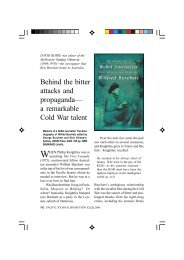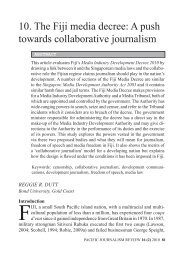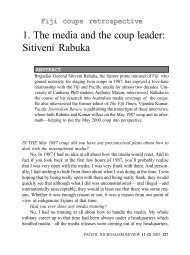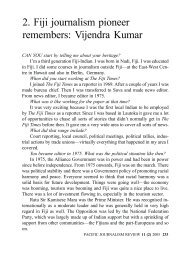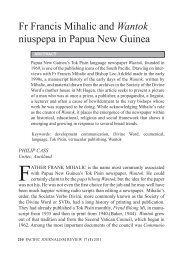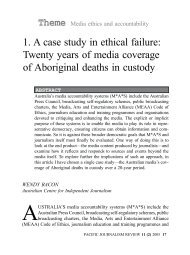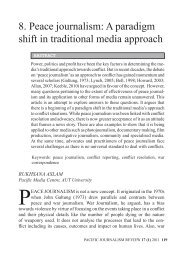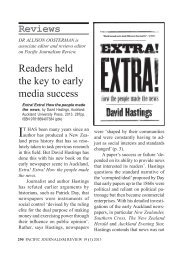Article Fiji's coup culture 1987-2006 - Pacific Journalism Review
Article Fiji's coup culture 1987-2006 - Pacific Journalism Review
Article Fiji's coup culture 1987-2006 - Pacific Journalism Review
You also want an ePaper? Increase the reach of your titles
YUMPU automatically turns print PDFs into web optimized ePapers that Google loves.
REBUILDING PUBLIC TRUST<br />
1970, p. 123). It was this thought of Fiji going into undesirable hands, among<br />
others, that prompted Fijian chiefs to cede Fiji to Great Britain.<br />
Fiji became a British Crown Colony on 10 October 1874 when growing<br />
European pressure on Fijian land and labour and their entanglement<br />
in internal Fijian rivalry for power and political ascendancy forced<br />
the self-styled Tui Viti, Ratu Seru Cakobau, to cede Fiji Islands to the<br />
United Kingdom. (Lal, 2010, p. 67)<br />
Lal (2010) refers to this as an unconditional transfer that was solemnised in<br />
the ‘Deed of Cession’ which outlined what chiefs had ceded or did not cede<br />
to the Crown, and how and in what way Fijian interests would remain ‘paramount’<br />
in Fiji (p. 67). It was the Independence Order of 1970 which formally<br />
brought this cession to an end nearly a century later.<br />
The early history suggests that Melanesian Fijians were fierce fighting<br />
people who had strong tribal affiliations and loyalties, and who had experience<br />
in espionage and <strong>coup</strong>s to take over the ruling of the islands. And that<br />
tendency appeared to have lingered on.<br />
It seems this cultural trait came into action when the Fijian chiefs lost<br />
power in <strong>1987</strong>. The early history of the Fijians, sees their regimes littered<br />
with episodes of tribal wars, <strong>coup</strong>s and counter <strong>coup</strong>s. Therefore one would<br />
not be incorrect in suggesting the term ‘<strong>coup</strong> <strong>culture</strong>’ for Fiji, as indeed it had<br />
been part of the Fijian <strong>culture</strong> long before the arrival of the missionaries and<br />
Christianity in the 18th and 19th centuries. In that spirit, this article also adopts<br />
the term ‘<strong>coup</strong> <strong>culture</strong>’ which is deemed appropriate given the prevalence of<br />
<strong>coup</strong>s in the early history of the indigenous Fijians.<br />
This article examines the reasons for a <strong>coup</strong> <strong>culture</strong> in Fiji and attempts<br />
to dig slightly deeper to try to fathom how a greater degree of analytical<br />
journalism may have been able to provide the underlying reasons for the fall<br />
of democracy in Fiji to military <strong>coup</strong>s since <strong>1987</strong>.<br />
The <strong>1987</strong> Coups: Sitiveni Rabuka<br />
Hansard records for ‘treason at ten’ on 14 May <strong>1987</strong> documented the following,<br />
just as one Member of Parliament who had the floor asked the speaker:<br />
‘How much time do I have, Sir,’ and the reply came ‘Press on regardless’<br />
when masked soldiers came into the Parliament:<br />
168 PACIFIC JOURNALISM REVIEW 18 (2) 2012



